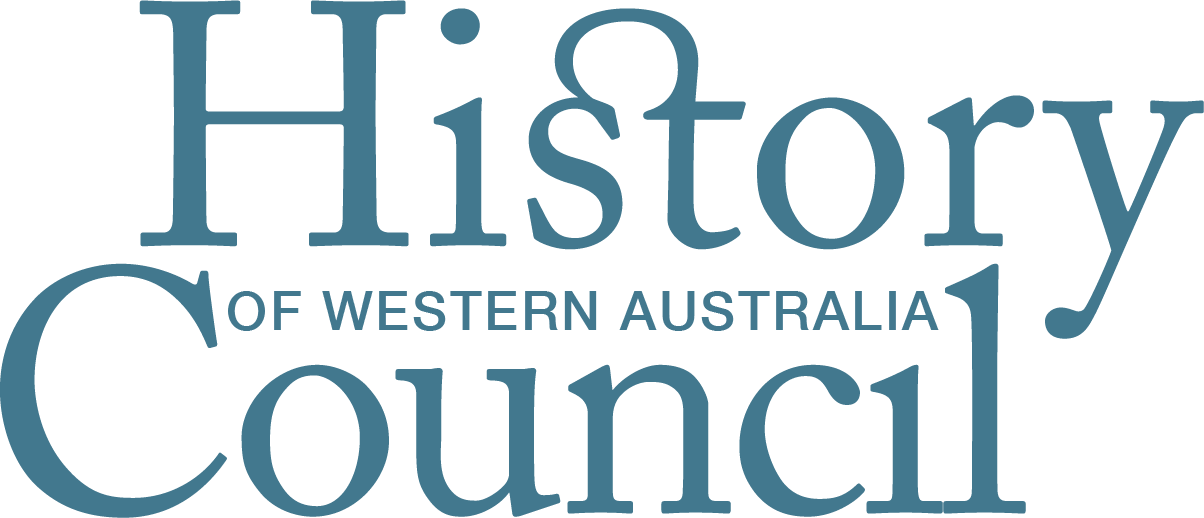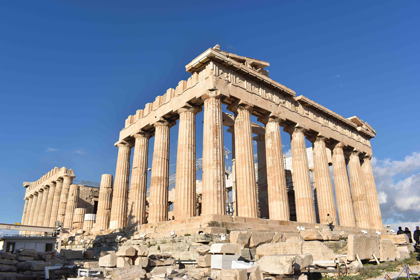Feature Article 1: Ancient History in Education
Classics and Ancient History at UWA
As it has done for more than a century, Classics and Ancient History at UWA continues to bring to life the glory and grandeur of ancient Greece and Rome, allowing Perth students to engage with the history, culture and — increasingly a rarity in the Australian educational landscape — the languages of these two foundational civilisations.
The temple of Olympian Zeus
For many of our students, that engagement now includes experiencing ancient ruins at first hand; when this newsletter goes to press, we will be welcoming home from Athens a group who joined fellow-students from the University of Sydney to study the wonders of archaic and classical Athenian architecture (the images below appear courtesy of 2018 UWA Classics students’ trip to Athens); others of our cohort have been getting to grips with Roman remains, one even braving very cold climes to work at the site of Vindolanda in Britain. The globe-trotting has not been confined to students. In co-operation with the Royal Commission of al-Ula, Emeritus Professor David Kennedy and his newly-expanded team have been applying the aerial archaeology techniques that David had developed in Jordan to ground-breaking surveys of archaeological sites in the Kingdom of Saudi Arabia. This work will provide invaluable data and guidance for the development of regional tourism and heritage protection in the region — a timely reminder that the study of antiquity often has a real impact in the modern world!
The Parthenon, Athens
The staff of Classics and Ancient History at UWA see it as our mission to foster interest in all things Greco-Roman in the WA community. If you are keen to explore these fascinating cultures — whether by doing individual undergraduate units purely for enjoyment, or deepening your skills by pursuing postgraduate research, or anything in between — don't hesitate to get in touch with the current Chair of Discipline, Lara O'Sullivan (lara.osullivan@uwa.edu.au). And for those who share our love of the ancient by teaching Ancient History in the secondary sector, do keep an eye out for our annual 'Ancient History School Essay Competition' for students in years 11 and 12; we are keen support to you and to encourage your students' passion for ancient history.
Dr Lara O’Sullivan UWA
High School Ancient History in WA
Ancient History has been running in WA Secondary Schools for decades and remains a popular, if small, subject choice for Year 11 and 12 students. Not having had any access to any Ancient History in the Syllabus since Year 7, many students return to it with gusto in their senior years.
In WA we offer the option to study Greek, Rome or Egypt in Year 12, but the choice for Year 11 is much wider – Roman Britain, the Celts, Thera, Kadesh, Masada, the destruction of Troy, Pompeii and Herculaneum, Cleopatra, Cao Cao and more, much of which is the stuff of legends or at the very least, a ripping good yarn.
Clearly the study of Ancient History has undeniable charm, it is easy to succumb to its wiles … what is there not to love? Dastardly deeds, notorious bad guys completely unrestrained by culture or ethics, bloody battles across continents, heinous injustice, leaders who were condemned/misunderstood/ reviewed by turns — exactly the stuff kids of all ages love.
The genre is also the basis of, and therefore incredibly similar to, so many of the video games which kids play that they also regularly find themselves during class time delightedly in the midst of an historical version of the allegory adopted by ‘Assassins Creed’, ‘World of Warcraft’ or even the iniquitous ‘GTA’ (to name a few) that they were playing with their friends on the X-Box last night; and in so doing providing the teacher with a source for many a welcome tangential class discussion about violence in politics…
The parallels between Ancient History and current events also takes 15-17-year-olds by surprise. It is an ongoing pleasure to see them making links between the foreign policy they hear about through daily news networks with the policies of the Athenian Empire in the 5th Century BC, or connecting the actions of Caligula in AD 43 and/or the late Dynasty 17 Egyptian/Hyksos standoff in c.1500BC, with current tension in the Middle East.
The dawning realisation that mankind seems to have somehow got itself stuck in a revolving historical door that is thousands of years old is a sobering thought for any 17-year-old, often effectively motivating students to learn more about the mistakes of the past in order to avoid them. But students also love the cultural explanations which come with a closer examination of Ancient History. The reason for and origins of so many (oftentimes quirky) cultural practices beliefs and even vocabulary use is a source of endless fascination and enlightenment. Perhaps most enjoyable of all though, is watching students come to terms with the notion that ‘we don’t know’ is sometimes the best conclusion we can reach – they really enjoy debunking the certainty that is so characteristic of high school level educational/text books, truly revelling in their new found ability to question ‘facts’ having discovered the contestability of so much of what they had previously learned, and accepted, about the way the world works. In short, Ancient History allows students to enjoy learning how to think critically — a truly wonderful thing to watch grow in young people. In order to express this new-found depth, students also have to improve their literacy, never a bad thing, thus many a reluctant reader completes their Ancient History study as a converted book worm with a respectable vocabulary to boot.
Until recently there was no opportunity for students to study Ancient History in Year 11 and 12 unless they chose it as an ATAR (Formerly TEE) subject complete with the rigours of the external exam. Thus was lost many a fascinated student. However, now we offer study to a wider range of students through the General Courses and many more are discovering what joy there is in digging into the ancient past
For some reason though we do not have the numbers in WA that Year 11 and 12 Ancient History attracts in the Eastern states — 10 x more than WA in fact, it’s bigger than Modern History — which is an ongoing puzzlement to both students and educators who have trod the ‘Ancient’ pathway. UWA offers opportunities for High School students to engage through their Classics Society essay competition, while the History Teachers Association of WA, UWA staff and the School Curriculum and Standards Authority have worked hard to grow numbers by developing curriculum which offers more flexibility in Year 11 and 12 syllabuses, and in providing support to both new and seasoned teachers, but the uptake has been slow.
It is anticipated that an adaptation to the external ATAR exam in 2019 will generate more enrolments. And let’s hope it does, because there are excellent opportunities for study at local and national universities for those wishing to pursue all things ancient at the Tertiary level (see Dr Lara O’Sullivan’s article above), indeed UWA and Macquarie University are internationally renowned for their research and conservation projects. Additionally, there are a startling number of prominent Classical and Archaeological experts in the Perth community available and willing to offer time, support and guidance for the interested.
Starting in 2017 HWATA also hosted national and international guest speakers with expertise in New Kingdom Egypt. Student tutorials, teacher training and free public lectures were presented by Alyce McClymont of Macquarie University and Edgar Pusch (now retired) who was the Director of the excavation of Pi Ramesse, capital city of Ramses II, for almost two decades. Special interest lectures are also regularly offered by UWA and the RAG (Roman Archaeology Group). Perth has a healthy, diverse and world class ‘Ancient’ community, thus we hope that this will grow passion among our High School students. Keep your eye out for notice of the 2019 lectures, which will be released through the HCWA networks.
So, for us Ancient types, very exciting indeed is a new exhibition hosted by WAM coming to WA in 2019/20 that will transport visitors back 2,000 years to one of the most epic, technologically significant times in the history of mankind, to Ancient Rome — a community culture and mindset strikingly similar to our own.
(Ed.)
Ancient Rome: Explore the Empire that Shaped the World
Opens at the Museum of the Goldfields in September and will tour both regional and metro WA Museums. Visitors will be able to learn about the military genius of Julius Caesar, admire the disruptive innovations that held the Roman Empire together for centuries, and marvel at the awe-inspiring technology used to construct Rome, which became known as the Eternal City.
‘Our artisans have meticulously reconstructed ancient Roman technology to scale from drawings using the same materials and techniques that the Romans used thousands of years ago,’ says Thomas Rizzo, exhibition director. ‘Many of the machines are interactive. The entire family will be able to get hands-on with these creations to learn about the fascinating history of ancient Rome, the lives of fearsome gladiators, and the innovations that set the Roman Empire apart from the rest of the world.’ Ancient Rome is touring WA following hugely successful showings in Rome, Melbourne, Adelaide, Hong Kong, China, Taipei, Macao, Korea and regional New Zealand.
Western Australian Museum of the Goldfields Acting Manager, Cara Haymes, said Ancient Rome provides a unique way for visitors of all ages and backgrounds to experience ancient history. ‘There are many highlights in this exhibition including inventions such as the book, paved roads, Roman arches, cranes and industrial machinery, water pumps and other technologies that continue to provide benefits in our modern-day world. I believe children and families, history buffs, engineers, military fanatics and those interested in the innovations of the world will thoroughly enjoy this exhibition’, she said. ‘The WA Museum is dedicated to bringing the world to the regional areas of Western Australia and we’re thrilled for the Artisans of Florence-International and The Niccolai Group to help us achieve this.
Ancient Rome features group activities, short documentaries, computer animations, the armour and weaponry of Roman centurions and gladiators, traditional Roman mosaics, frescoes, games and a sample of original artefacts.
Ancient Rome: The Empire That Shaped The World will be on display in WA at:
Museum of the Goldfields from 15 September to 25 November 2018;
Museum of Geraldton from 8 December to 31 March 2019;
Museum of the Great Southern from 13 April to 21 July 2019; and
WA Maritime Museum from 6 December to 26 April 2020.
See: http://museum.wa.gov.au/about/latest-news/exhibition-brings-ancient-rome-wa-first-time


